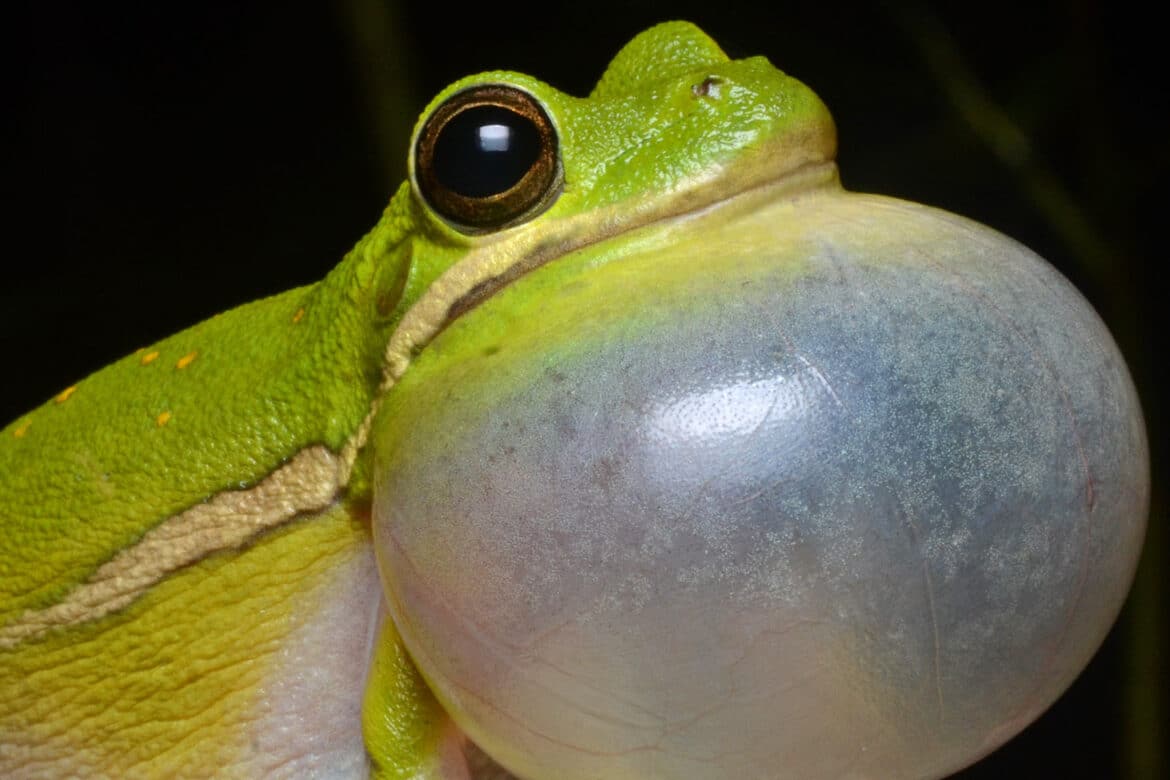827
Why do frogs croak? They are known for their characteristic croaking, but what is behind it? This article highlights the various reasons why frogs croak, their means of communication, and how environmental factors influence their behavior.
Why do frogs croak for reproduction? The role of mating calls
Frogs are among the loudest creatures in nature, especially at dusk and during the night. But why do frogs croak?
- Frogs croak mainly as a mating call. Male frogs use croaking to attract females. The volume and frequency of the croaking can provide information about the size and strength of the male.
- During the mating season, a veritable concert develops, with each male trying to drown out his competitors. This acoustic competition is crucial because it helps female frogs find the most suitable mate.
- Interestingly, different frog species have their own call patterns, allowing them to distinguish each other even in species-rich habitats. This allows females to recognize males of their own species even in the midst of a loud frog concert.
- Croaking can also serve as a signal to other males that a particular area is occupied. This prevents unnecessary conflicts and ensures that the animals can concentrate on courtship.
Frogs croak to communicate: territorial behavior and more
In addition to reproduction, there are other reasons why frogs croak.
- Frogs do not only communicate with each other during the mating season. They also use their calls to mark their territory and deter intruders. A loud croaking signals to other males that an area is already claimed.
- In densely populated areas, croaking can help to avoid conflicts. By clearly establishing acoustic boundaries, frogs can save energy that they would otherwise have to invest in physical confrontations.
- Some frog species use specific calls to warn their conspecifics of danger. Such warning calls can be heard when predators are approaching or when there are sudden changes in the environment.
- Croaking can also serve to locate lost group members. Young frogs that have lost their way can be guided back to the group by calling to their fellow frogs.
How environmental factors influence the croaking of frogs
The environment also has a significant influence on the croaking behavior of frogs.
- Temperature and humidity play an important role in croaking behavior. Frogs are more active on warmer nights and can therefore be heard more often, as these conditions are ideal for reproduction.
- Pollution and noise pollution can significantly disrupt croaking behavior. In urban areas, frogs often have to croak louder to be heard above the background noise, which costs additional energy.
- Climate change-induced changes in seasons and weather conditions can also influence croaking behavior. Earlier or later spring starts lead to a shift in mating seasons.
- Light pollution can disrupt natural croaking behavior at night. Artificial light can disrupt the day-night rhythm of frogs, which can have negative effects on their reproduction and survival chances.
Unique frog calls: Special species and their croaking sounds
Frogs are fascinating creatures with diverse lifestyles.
- The tree frog is known for its loud, melodic croaking, which can often be heard in marshy areas. Its call is often considered an indicator of environmental health.
- The grass frog does not croak in the classic sense like the pond frog, but rather emits deep, quiet growling and grunting sounds. These sounds are usually produced underwater and sound like a dull hum or growl to the human ear.
- The pond frog croaks loudly and clearly during the mating season in spring, usually at temperatures above 20 °C. Its call is a characteristic, rhythmic “quack quack quack” or “krrroak” in rising and falling tones, which is often perceived as a loud concert of several males.
- The red-eyed tree frog, easily recognizable by its bright eyes, uses a variety of calls to attract females and ward off rivals.
- The bullfrog, one of the largest frog species, has a deep, thunderous call that can be heard for miles. Its loud croaking reflects its imposing size.
- Some frog species, such as the Pacific tree frog, use so-called “rain calls” that occur when rainfall is imminent. These calls serve as a signal to other frogs that conditions are improving for spawning.

